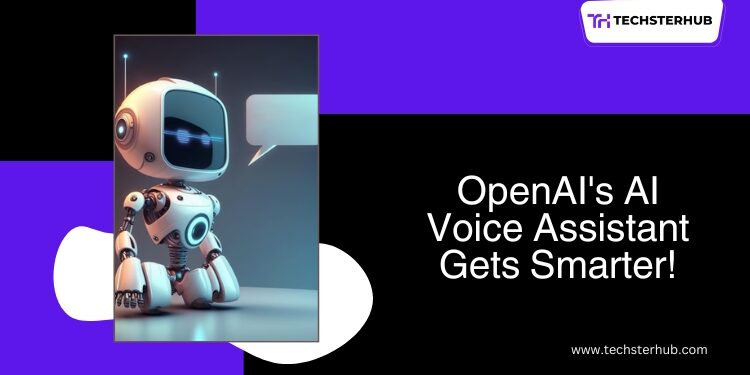The leading AI research company OpenAI which developed the popular GPT models has revealed major enhancements to its AI voice assistant. The company states that the voice assistant’s ability to hold natural and engaging conversations has been greatly improved by the new updates. AI voice assistants represent a significant advancement because they now understand complex human interactions better than before which creates a more natural and human-like conversation experience.
Voice assistants now play a growing role in our daily activities through task assistance and conversation support. The latest version of OpenAI’s AI voice assistant aims to deliver smoother and more human-like interactions that feel intuitive for users. We will explore how the new voice assistant improves performance and why these advancements are crucial for AI communication’s future.
What Is OpenAI’s Voice Assistant?
The same advanced language models that established OpenAI’s reputation power their voice assistant technology. The GPT (Generative Pre-trained Transformers) models along with other models are engineered to process human language and produce text that mimics human communication. OpenAI previously showed that their models are capable of producing top-notch written materials while engaging in conversations and executing user-directed tasks.
The unique feature of OpenAI’s voice assistant lies in its capacity to comprehend spoken language and deliver responses that sound natural. You can communicate with the assistant through spoken language instead of writing questions or commands to receive immediate answers and assistance. OpenAI’s voice assistant integrates speech recognition with natural language processing to enable AI-powered dialogues which allow users to engage with their devices seamlessly.
What’s New in the Latest Update?
The voice assistant by OpenAI has received multiple key upgrades that improve its conversation quality and realism when interacting with users. Some of the most significant updates include:
- More Natural Conversations: The latest update to the voice assistant brings significant improvement by producing speech that sounds more natural. Old AI voice assistants produced robotic sound patterns which created a mechanical distance between users and their devices. The upgraded model delivers a conversational tone that enhances speech flow and intonation. The voice assistant produces sound that mimics a genuine person involved in a dialogue because real interaction feels more engaging to users than artificial exchanges.
- Better Context Understanding: The assistant now has greatly improved capabilities in understanding context. Voice assistants in earlier versions often had difficulty retaining information from previous dialogues and understanding complex questions with multiple parts. The voice assistant from OpenAI now understands context much better after the latest update which leads to more accurate and relevant responses. The assistant now monitors active discussions while recognizing additional questions and delivers customized answers.
- Faster and More Accurate Responses: Processing speed improvements allow the assistant to provide faster responses to users. Users now experience shorter response times when asking questions. The assistant now performs better at understanding spoken language which boosts its command recognition accuracy even when the user’s speech includes accents or lacks clarity.
- Expanded Capabilities: The voice assistant from OpenAI now supports a broader set of functions. The assistant has been built with versatility in mind through features that include setting reminders and sending messages along with playing music and controlling smart home devices. Users can depend on this technology for additional daily tasks which results in a seamless experience for regular smart device users.
- Emotional Tone and Empathy: The assistant demonstrates enhanced performance in recognizing emotional cues from users’ voices which stands out as an exceptional advancement. The assistant now provides empathetic and sensitive responses because it understands the user’s mood and tailors its reactions to match. The AI adapts its tone and language to match user emotions such as frustration, happiness, or stress resulting in responses that feel more compassionate and human-like.
Why Does This Matter?
The advancements OpenAI made in its voice assistant technology present transformative opportunities for users and developers alike. Here’s why:
- More Human-Like Interactions: OpenAI has greatly advanced human-machine interaction through their development of voice assistants that speak more naturally and manage complex dialogues. Users frequently express dissatisfaction with voice assistants because they often struggle to understand context and generate robotic responses during conversations. The latest updates allow OpenAI to create a voice assistant that users find more helpful and enjoyable to use which may boost the regular use of AI assistants in daily activities.
- Enhanced Personalization: The assistant’s ability to detect context and emotional tone results in delivering experiences that are customized for each user. When users seek help or guidance for challenging tasks, the assistant tailors its replies depending on the conversation’s tone to provide more relevant assistance. People who depend on voice assistants for both professional inquiries and emotional support will benefit from improved functionality through these enhancements.
- Better Accessibility: Through enhancements in speech recognition and understanding different accents OpenAI is expanding access to its voice assistant for a wider audience. The assistant becomes a useful tool worldwide because users with diverse speech patterns as well as English language speakers find it easier to interact with it.
- Broader Applications in Various Industries: The advancements in natural language processing and speech recognition enable more extensive integration of voice assistants across different industries. The ability of this technology to deliver more precise human-like interactions makes it a valuable asset across professional environments like customer service and healthcare as well as education and entertainment. In medical environments AI voice assistants can support doctors by addressing patient questions and directing them through medical instructions.
What Does This Mean for the Future of Voice Assistants?
OpenAI’s advances in voice assistant technology mark the initial stages of what could transform our interactions with technology. Advancements in AI models will lead to voice assistants becoming significantly smarter and more advanced. Upcoming updates could enable voice assistants to conduct deeper conversations while functioning in multiple languages and interpreting visual information through sophisticated computer vision technology.
AI assistant integration into daily tasks will likely keep expanding over time. AI assistants will become essential components of everyday life in homes, cars, offices, and schools by assisting with tasks such as scheduling management and decision-making while providing personalized recommendations. The progress made by OpenAI will bring human-like interactions to a new level that feels like talking to an actual person.
Challenges Ahead
OpenAI’s voice assistant technology has achieved substantial progress but continues to face several unresolved issues. The priority to safeguard privacy and security in AI system interactions will increase as these systems become more embedded in both personal and professional environments. The assistant needs to keep developing its capabilities to understand increasingly complex tasks and queries while accurately interpreting what users intend to communicate.
Conclusion: A Major Leap Forward for AI Voice Assistants
The upgraded voice assistant from OpenAI represents a substantial advancement in the evolution of artificial intelligence technology. The voice assistant now provides improved conversation flow and context understanding along with faster operations and emotional tone detection which makes it more human-like to better engage users and enhance usability. Future advances in artificial intelligence will lead to voice assistants becoming essential parts of our everyday activities while helping us accomplish tasks and solve problems through new connections.
OpenAI leads the way in developing AI communication and transforms AI assistants into human-like companions who understand and respond as expected from human interaction.











